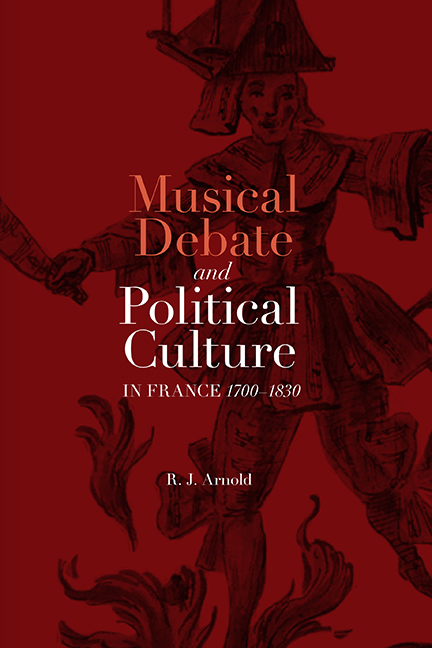Book contents
- Frontmatter
- Contents
- List of Illustrations
- Introduction
- 1 Parallels, Comparisons and Ripostes: The Raguenet–Lecerf Controversy, 1702–32
- 2 Spectators, Satirists and Sectarians: The Ramiste–Lulliste Querelle, 1733–51
- 3 'A Vast Negotiation': The Querelle des Bouffons, 1752–54
- 4 The Spirit of Contradiction: The Gluckiste–Piccinniste Querelle, 1774–88
- 5 A Revolutionary Interlude: 1789–1800
- 6 The End of the Party: New Avenues for Musical Dispute, 1800–30
- Conclusion
- Select Bibliography
- Index
- Music in Society and Culture
2 - Spectators, Satirists and Sectarians: The Ramiste–Lulliste Querelle, 1733–51
Published online by Cambridge University Press: 29 May 2021
- Frontmatter
- Contents
- List of Illustrations
- Introduction
- 1 Parallels, Comparisons and Ripostes: The Raguenet–Lecerf Controversy, 1702–32
- 2 Spectators, Satirists and Sectarians: The Ramiste–Lulliste Querelle, 1733–51
- 3 'A Vast Negotiation': The Querelle des Bouffons, 1752–54
- 4 The Spirit of Contradiction: The Gluckiste–Piccinniste Querelle, 1774–88
- 5 A Revolutionary Interlude: 1789–1800
- 6 The End of the Party: New Avenues for Musical Dispute, 1800–30
- Conclusion
- Select Bibliography
- Index
- Music in Society and Culture
Summary
IN 1734 Jean de Serré de Rieux published an updated edition of his poem La Musique, twenty years after its first appearance. The new version contained numerous textual amendments, all serving to make the pacific message of the work even more obvious: some criticisms of both the French and the Italian schools were smoothed over, and passages emphasising international concord and cooperation were interpolated. Even more than in 1714, the result was a poem that told the story of music in terms of harmonious cohabitation, in which everyone had had something to contribute, and which would go forward toward fresh glories if people could only set aside their rivalries. It is not known what prompted Serré de Rieux to rework La Musique at this point, but the timing was apt. In the previous year the first production of an opera by Jean-Philippe Rameau had reconfigured and intensified the debate over the course of music.
The premiere of Hippolyte et Aricie in October 1733, produced when Rameau was fifty and after he had acquired a reputation as a church musician, as a composer of chamber and instrumental music and, most prominently, as a theorist of music, has generated its own mythology. His enemies had long worked to prevent him climbing onto the dramatic stage, wrote Hugues Maret in the eulogy he delivered to the Dijon Academy in 1765, the year after Rameau's death: ‘they combined and conspired to make him fall off it with infamy’. On the first night of Hippolyte et Aricie, ‘the curtain had barely risen, when a dull noise began to form in the parterre, which, growing little by little, announced to Rameau a failure of the most unequivocal nature’. Even those who were more positively inclined to the music, Maret continued, were so stupefied by it that they kept silent. This notion of a sudden, startling assault on the sensibilities of the Parisian audience is generally followed in more recent accounts: Graham Sadler, a leading modern scholar of Rameau, wrote that Hippolyte et Aricie ‘burst upon an unsuspecting public’. It should be emphasised, however, that there was no great evidence in purely contemporary sources in 1733 of unusual levels of emotion, or even particularly attention, being generated by the premiere (although there was some, as we shall see).
- Type
- Chapter
- Information
- Publisher: Boydell & BrewerPrint publication year: 2017



